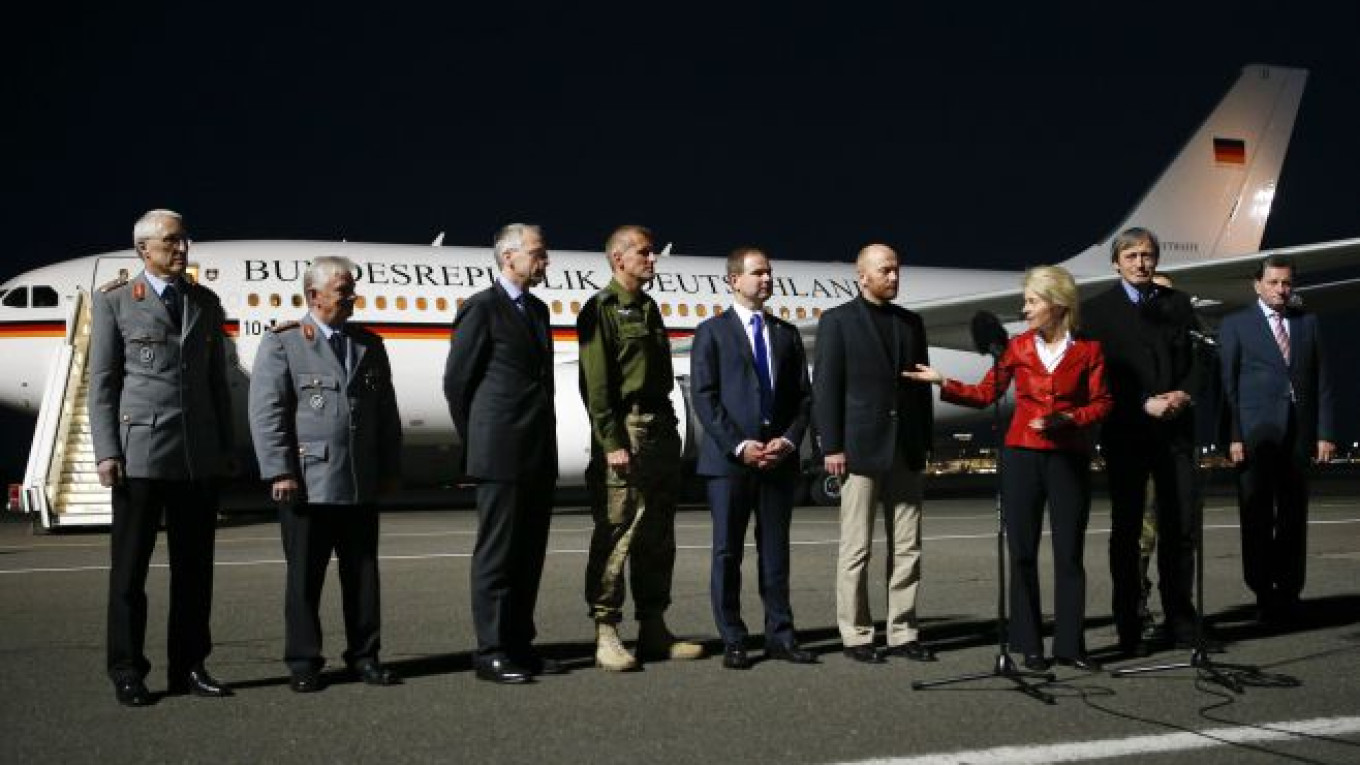Former German Chancellor Gerhard Schröder said on Sunday his controversial meeting with Vladimir Putin helped win the release of European military observers held in eastern Ukraine days later and he urged the West to stop focusing on sanctions on Russia.
Criticized for media pictures that showed him warmly embracing the Russian president at an April 28 meeting in St. Petersburg, Schröder said he appealed to Putin to do what he could to free the seven Organization for Security and Cooperation in Europe, or OSCE, observers. They were released on May 3.
"The Russian president is not a persona non grata," Schröder told Welt am Sonntag newspaper when asked about whether it was appropriate to invite Putin to a party celebrating his 70th birthday. "I was really pleased he was able to come because I knew there would be a chance to talk."
Schröder was attacked in German media for bear-hugging Putin at a time of high tension between the West and Russia over Ukraine.
Chancellor Angela Merkel's government immediately distanced itself from Schröder.
The meeting underscored German ambivalence about tougher sanctions on Moscow over Ukraine, where pro-Russian separatists have taken over government buildings in the east and are holding a referendum on self-rule on Sunday — less than two months after Russia annexed the Crimean region following a similar referendum.
Schröder said he had talked to Putin about Ukraine.
"And as far as the situation with the OSCE observers goes, it led to a successful result. I used the chance to ask President Putin to help free the hostages."
Separatists had captured the monitoring team on April 25 and called them prisoners of war. A Swede was freed on health grounds, while four Germans, a Czech, a Dane and a Pole were held until May 3.
Talking To Putin
"I believe talking to the Russian president is the right thing to do," Schröder said. "I don't have anything to hide, and I'm not going to change the way I am. That's the way we've been greeting each other (bear hug) for the last 14 years, and that's not going to change even in tough times."
Chancellor from 1998-2005, Schröder has been Putin's best friend in the West since both were ostracized by U.S. President George W. Bush for opposing the 2003 Iraq invasion, but he is sometimes called a Putin apologist in the West.
"One should be speaking less about sanctions right now but instead about Russia's security interests," Schröder said when asked if he was disappointed with Merkel's crisis management. "I keep hearing that the West 'has to isolate Russia and Putin'."
On Saturday Merkel and French President Francois Hollande said they were ready to agree more extensive sanctions against Russia if a planned presidential election in Ukraine on May 25 is foiled.
Schröder has been excoriated for speaking out in favor of Moscow and against the German government position at times during the Ukraine crisis. His critics say his views are colored by his 250,000 euro salary as board chairman for a pipeline joint venture with Russian gas monopoly Gazprom.
But others believe the former chancellor's friendship with the Kremlin leader keeps open an important channel of dialogue for Germany.
Schröder said the climate during his one-to-one meeting with Putin was "friendly but also serious". He declined to reveal further details of their talks.
Schröder said he did not talk to Merkel nor Foreign Minister Frank-Walter Steinmeier, an ally in their center-left Social Democrat (SPD) party. He said his interest in Russia goes beyond Putin and the fact he adopted two children from Russia.
"It's got an historical dimension," he said. "We Germans are responsible for the deaths of 25 million from the Soviet Union during World War Two. The reconciliation with Russia is pretty miraculous. Russians like Germans. It fascinates me that could happen after the horrors of the war. That's something of such great value that we can't be allowed to just squander it."
See related stories:
Putin Not Invited to Schröder's 70th Birthday Bash
Putin Embrace Gets Schröder Into Trouble With German Government
A Message from The Moscow Times:
Dear readers,
We are facing unprecedented challenges. Russia's Prosecutor General's Office has designated The Moscow Times as an "undesirable" organization, criminalizing our work and putting our staff at risk of prosecution. This follows our earlier unjust labeling as a "foreign agent."
These actions are direct attempts to silence independent journalism in Russia. The authorities claim our work "discredits the decisions of the Russian leadership." We see things differently: we strive to provide accurate, unbiased reporting on Russia.
We, the journalists of The Moscow Times, refuse to be silenced. But to continue our work, we need your help.
Your support, no matter how small, makes a world of difference. If you can, please support us monthly starting from just $2. It's quick to set up, and every contribution makes a significant impact.
By supporting The Moscow Times, you're defending open, independent journalism in the face of repression. Thank you for standing with us.
Remind me later.


